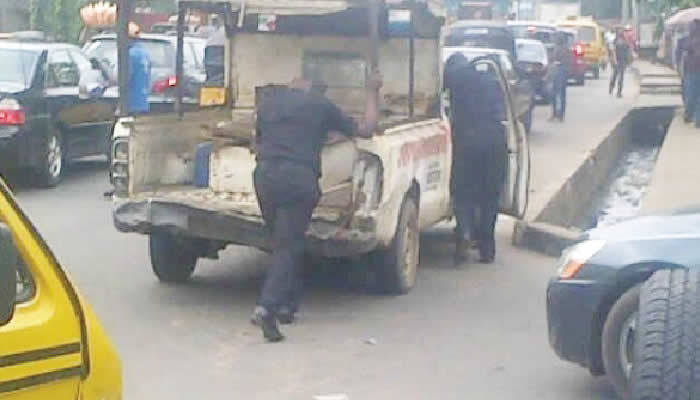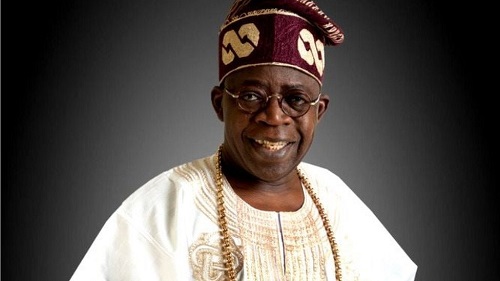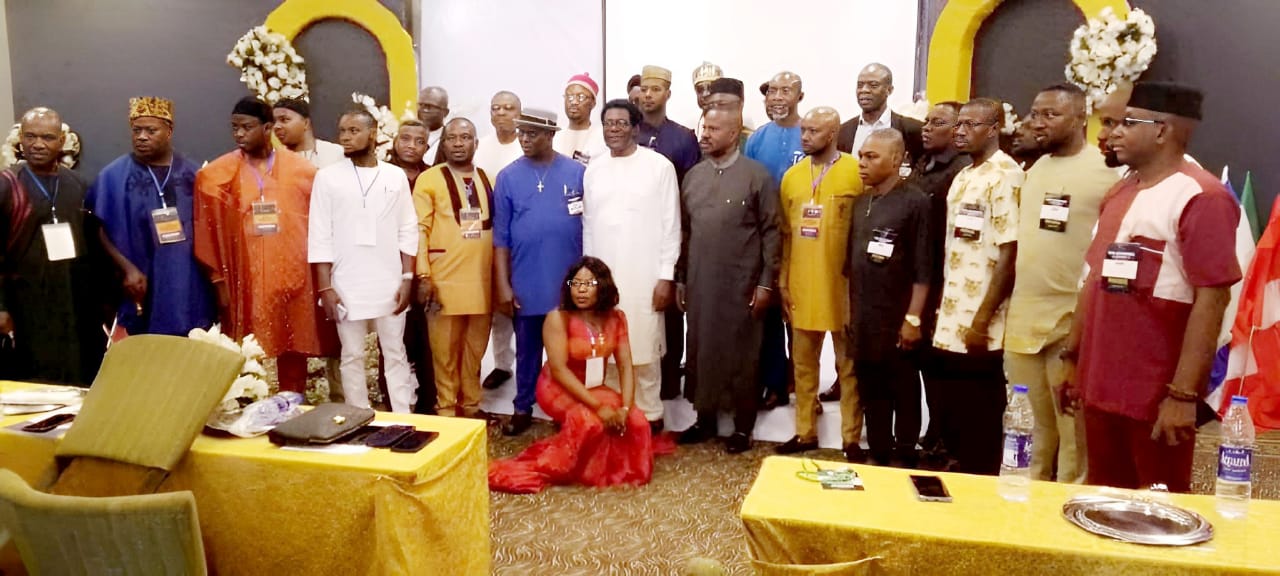
JANET OGUNDEPO examines the trend of law enforcers with penchant for lawlessness
The Ayodeles (not real name) were on their way from Ibadan, Oyo State, to attend the Christian wake of their aged relative in Lagos when they sighted a gridlock around Ibafo on the Lagos-Ibadan Expressway.
Understandably, they became apprehensive regarding meeting up with the event if the traffic persisted. It was even more worrisome for them because the head of the family, who had a significant role to play in the event, was in the car.
A ray of hope appeared when the driver sighted the patrol vehicle of the Federal Road Safety Corps driving against traffic in the other lane. The driver quickly manoeuvred to the other lane and followed the FRSC vehicle at a distance.
In the video recording our correspondent obtained from one of the occupants of the car, the travellers had two things to be grateful for; they escaped the gridlock and they felt sufficiently covered since the FRSC vehicle in front of them also broke the law and would likely not arrest them.
That is one of many cases where agencies saddled with the responsibility of enforcing the law take the lead in breaking it, usually with reckless impunity.
In a viral video recently, a FRSC patrol van engaging in wrong-way driving was accosted by the driver of a sport utility vehicle. From the video recorded by another motorist, the verbal exchange between the driver of the SUV and that of the patrol van forced the latter to make a U-turn and take the right lane.
Driving against traffic is offence number three and nine of section D: Traffic Offences, of the Nigeria Highway Code. It highlights 47 traffic offences in which members of the FRSC have the right to arrest and prosecute any person reasonably suspected to have committed any traffic offence. It states, “Use a restricted road where it is marked “one way” or “no entry” and “disobey or disregard road signs or pavement markings,” respectively. The penalty for route violation according to the official website of the FRSC, is a fee of N5,000.
Not only officials of the FRSC are guilty of driving against traffic, other security operatives such as men of the police force, the army, escorts and even drivers of bullion vans have been caught many times perpetrating the acts across the country. Some of them, sadly, have led to the killing of other road users.
In a report, a motorcycle operator was killed by a bullion van driver driving against traffic in Ughelli, Delta State.
The victim, one Julius Umukoro, was reported to have died instantly when the driver of the bullion van rammed into him. He left behind his wife and children.
In 2019, The PUNCH reported the arraignment of a bullion van driver caught driving against traffic.
The driver, Mr Bamidele Ezekiel, who was charged before a magistrates’ court, pleaded not guilty to the charge.
Ezekiel was quoted as saying, “Yes, I drove against traffic and I am appealing to the government to please temper justice with mercy as I promise never to do such again.”
Recently, our correspondent was on a bus when a soldier, riding a motorcycle, discovered that he was driving towards a wrong route and hurriedly made a turn at a wrong intersection. This sight is commonplace. Uniformed men arrogantly take routes where activities of commercial bikes popularly called Okada have been banned. Some of them drive bikes without number plates, thus boosting the confidence of lawless Okada riders to emulate the unlawful act.
During the tenure of ex-Lagos State governor, Babatunde Fashola, he intercepted a colonel, KI Yusuf and a staff sergeant, AJ Adeomi, for driving on the dedicated lane of the Bus Rapid Transit in Outer Marina in 2012.
Reckless driving by convoys of a former Kogi State governor, Idris Wada, led to the death of one of his aide-de-camp, Idris Mohammed, in 2012.
Convoys of ex-governors of Edo and Nasarawa states, Adams Oshiomhole, and Tanko al-Makura respectively, and a former Minister of Petroleum, Diezani Alison-Maduaeke, have caused accidents that led to the deaths of civilians without any reported compensation or condemnation for the acts.
Guilty of offence accused others of
According to the Nigerian Highway Code, the penalty for driving with worn-out tyre or without spare tyre is N3,000 payable to the Federal Government Revenue Account. However, on December 23, 2021, an author and motorist, Lemi Jonathan, accused FRSC officials of Afikpo command, Ebonyi State, of charging one of the cars he was journeying with of driving with an expired tyre while the four tyres of the officials’ van were all expired.
Jonathan said, “I encountered road safety men today from Afikpo command. They stopped our vehicles and charged the second car with me with an expired tyre offence. I acknowledged the fact that the tyre they saw is above years but all my pleas fell on deaf ears.”
He added that he took a look at the tyres of the FRSC vehicle and saw that they were all expired. He said he called their attention to the fact that their tyres were expired but he was told that they were aware.
Jonathan added, “I asked one of them if he was aware that their tyres are all expired, he said he was aware but that they have written to their command for over a year now but still told to manage them. How could they be charging me for the same offence they are massively committing? Mine was a tyre, theirs were all tyres. The officer said immunity covers them.”

“Urinating, fighting, smoking, extorting’’
“Order by Police” are common on some caution signs placed at the gates of some private or commercial buildings. Some to warn anyone not to park a vehicle at the spot, urinate, excrete or dump waste.
However, two years ago, the internet was awash with the picture of a cop caught on camera peeing directly in front of a banner with the inscription, “Do not urinate here, order by police. Defaulters will be prosecuted.’’
The officer, in police uniform without a cap, held what seemed like a bag at his side as he urinated at the spot.
Also, two policemen in uniform were caught on camera urinating at a low fence of what appeared to be an abandoned plot.
The police, in 2017, established a unit called The X-Squad of the Force and saddled it with the responsibility of “arresting, investigating, discipline and prosecution of erring officers and men of the Force that are accused of corruption, corrupt tendencies, and those who compromised their official positions for pecuniary gains/interests.”
It seems not much has been done as officials still break the laws they are meant to enforce. Also, while still on duty, many cops had been caught sleeping with their guns by their sides at the risk of being stolen or snatched to commit crimes. Some have been videoed fighting each other or counting monies extorted at checkpoints and collecting bribes.
Over the years, only a few cases of corrupt officials have been reportedly brought before the squad and tried.
Social media is awash with tales of security operatives manning the road and requesting bribes from road users, especially drivers of commercial vehicles at checkpoints.
Barely a day passes without a Nigerian complaining of the excesses of security agents.
“Bail is free” is boldly written at the counter of many police stations across the country. But many Nigerians who had got their loved ones out of police custody had parted with money.
Bribery is no longer news in Nigeria. Many pictures on social media and several experiences of individuals detailed the day-to-day extortion by cops.
In 2020, youths protested against brutality, victimisation and extortion by men of the now disbanded Special Anti-Robbery Squad in what has become famously known as #EndSARS protests.
Recently, a picture of a policeman caught smoking weed went viral. The officer, later identified by the police as ASP Babatunde Adebayo, was captured seated behind a truck with his gun resting on his lap, and a wrap of weed held in between the fingers of his right hand. He was said to be in the Ijora area of Lagos State at the time but according to the state police spokesperson, Benjamin Hundeyin, he was caught and subjected to disciplinary actions.
Also, a group of three armed cops were also pictured drinking alcohol. However, in March, the Lagos Commissioner of Police, Abiodun Alabi, gave an order that police officers requesting money for bail should be reported to the highest authorities. Law breakers are also among senior officials.
A former Inspector-General of Police, Tafa Balogun, was convicted in 2005 on eight charges of corruption.
On Saturday, there was a gridlock on the Lagos-Ibadan Expressway along the Long Bridge and an army van with number plate NA578 meandered out of the column of vehicles dangerously to engage in a wrong-way driving. Observing the unruly act of the soldiers, many commercial vehicles pulled out of the long queue to join the van, speeding dangerously onward Lagos end of the expressway.

Citizens, law enforcers deserve equal punishment—lawyers
Reacting to the issue, social commentators and legal practitioners have said that law enforcers who flout the law should be tried like others.
A strategy & transformation expert and social commentator, Ayo-Bankole Akintujoye, said that the current system in place gave room for impunity and lawlessness to thrive among law enforcers.
Akintujoye stated, “A system is essentially the interconnectedness of multiple parts to achieve a desired result. Irrespective of whatever your function in society is, whether you are a law enforcer or a citizen or a member of government or whatever, you can only do to the extent that the system or society allows you.
“An officer who is supposed to enforce cleanliness or orderliness but there is no traffic light, no orderliness, no public toilet, no light, then how does he do his job? It is going to be difficult to maintain sanity in that kind of environment. Yes, they should live by the law but it is a systemic problem and until we begin to fix the system from the root, we are going to continue to live for a long time with those who are supposed to be custodians of law breaking the law not because they want to but because they have no choice. However this is not a justification for them to break the law.”
He added that the law breaking activities of law enforcers affected the perception of civilians to uniformed men.
Akintujoye noted that there was a need for a paradigm shift in mindset, discipline and value system to check continuation of lawlessness among uniform men.
The social commentator added, “We need to fix that paradigm shift that can rally everyone to behave and comply with the law whether one is a law enforcer or not.”
On his part, a lawyer and president of the Association of Lawyers with Disabilities in Nigeria, Daniel Onwe, said that law-breaking uniformed men encouraged citizens to the same thing by their actions.
He added that the law was applicable to both citizens and law enforcers, stating that the same punishment was meted out to those caught flouting the law.
Onwe said, “There are no two sets of laws – one for law enforcement agents and one for others. This one set of laws is applicable to all. In fact, law enforcers should show a higher standard of obedience to the law. Of course, when law enforcers turn round to break the law they are paid to enforce, it encourages other citizens to follow suit.”
In his view, a lawyer and human rights activist, Festus Ogun, said that law enforcers were a creation of the law and they cannot act as if they were above the law.
Ogun added, “Section 1 of the constitution is clear that the constitution is supreme and has binding form against all authorities and persons. Nobody can act as though he is above the law. That is why we have the principle of the rule of law that whether you are the president, vice president, governor, commissioner of police, director of DSS (Department of State Services), the law is above you. That is why it is completely unlawful, unacceptable, precarious and dangerous for our country to see a growing culture of impunity.
“Ordinarily, they should be above board because they are the ones enforcing the law, they should not be found breaking the law. They are enforcing the law because the law has provided them with the mandate to enforce the law. So morally and legally, they are expected to live and act within the confines of the law and not outside the four walls of our laws and constitution.
“Basically, the challenge in Nigeria is that there are no consequences for impunity that is why on a daily basis we have cases of violations of laws, abuse of human rights and sheer recklessness in open violation of the law. This is because we have an untamed culture of impunity. If a policeman acts recklessly, no one is calling him to question because the person to question him benefits directly from his act of impunity. That is the quagmire that we find ourselves in.”
Ogun expressed concern over the acceptance of impunity by the citizens and encouraged them to challenge cases of impunity by those in positions of authority and security agencies at the court of law.
He noted that the disregard for the law sent a message to the future generation that “you become a fool obeying the law.”
Oshoma said, “If a man who is to enforce a law is lawless, the example he is setting is that there is no need for others to be law-abiding. This is because what moral justification will you have to enforce the law against a law-breaker when you are the number one culprit in breaking the law. That is why in Nigeria, it is easy to compromise the enforcement of the law because the man who is to enforce the law is corrupt. In some cases, he takes bribes. In some cases, he is the one leading the charge at breaking the law.”
He added that the country needed strong institutions and not strong human beings.
“This is because when you find a man who stands tall and says the law must be obeyed, he becomes the only strong man in the middle and the day he leaves the stage, everything is back to normal. But if we have a system in place where people, irrespective of their positions, are made to face the law immediately they break it, everybody will comply.
“But now, who are you to investigate a rich man if the president’s body language does not say go and investigate. We also know that people who are members of the ruling class even when they are investigated, in some cases, the investigation does not see the light of the day and in other cases, when they are convicted, they are granted a pardon. What that does is to demoralise people who want to enforce the law.”
He urged every citizen, regardless of positions, to comply with the law, adding that the rule of law stipulated equality before the law.
Oshoma stated, “We face the challenge of inequality because though there is equality before the law, at the end of the day, there are some people who are above the law. Until we change that mindset and orientation, we really cannot build a society where truly we say the law will prevail over everything or the court becomes the last hope of the common man. This is especially when the law enforcers are above the law.”
Law-breaking cops’ll face the law–Police
Contacted, the Force Spokesperson, CSP Muyiwa Adejobi, said that there was no sacred cow in the force, adding that there were measures within the force to punish erring cops.
Adejobi said, “Any officer who breaks the law will be made to face the law. There is no sacred cow in the police. We have two ways to handle such a case. First, through the Orderly Room Trial for disciplinary offence and second, prosecution in court if it is a criminal offence. We have mechanisms for such.”
Wrong-way driving an offence, says FRSC
In his contribution, the FRSC Public Education Officer, Bisi Kazeem, said that officers caught in acts of misdeeds would be punished in accordance with the law.
Kazeem said, “I have no information that anyone drives against traffic. If there is any proof, we shall deal with such a person as a traffic offender.”








